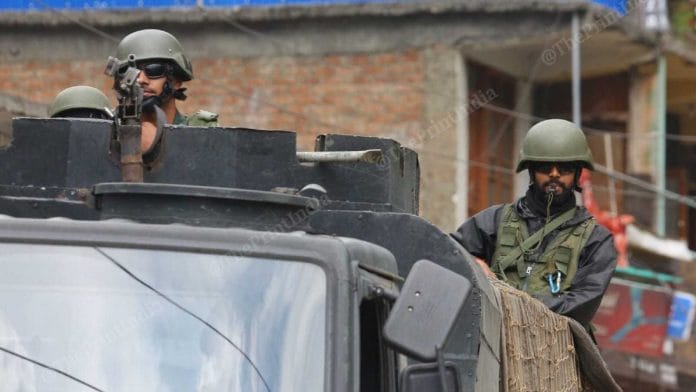New Delhi: As the dust settles on India-Pakistan hostilities with an understanding in place, the security apparatus in Jammu and Kashmir remains on high alert. A barrage of intelligence inputs suggests sleeper cells of various terror outfits have been reactivated, and relaying information on troop movements to handlers in Pakistan, bringing the threat of sporadic terror attacks back into focus after a period of relative peace in the Valley, ThePrint has learnt.
A senior J&K police officer told ThePrint they have been keeping a close watch overground workers (OGWs), both active and dormant, who have operated in Kashmir in recent years.
According to technical intelligence inputs, it has been found that several sleeper cells in the region have been in direct contact with their handlers in Pakistan, the officer said.
These networks, the officer added, were found to be involved in transmitting sensitive and strategic information about security forces and key installations through messaging apps such as WhatsApp, Telegram and Signal. “They have become active again. We have multiple inputs indicating that these OGWs are sending information to their handlers in Pakistan about troop movements, deployments, including visuals, along with other critical data. This is extremely damaging,” a senior police officer told ThePrint.
To counter this threat, the State Investigation Agency has been conducting raids across districts in South Kashmir and has rounded up over 100 individuals for questioning.
“Preliminary investigations have clearly revealed that these individuals are actively involved in terrorist conspiracies. They are promoting and spreading anti-India narratives aimed not only at challenging the sovereignty and territorial integrity of the country but also at inciting disaffection, public disorder and communal hatred,” a second officer said.
He added that these terror associates were also involved in online radical propaganda at the behest of terrorist commanders from groups including Lashkar-e-Taiba (LeT) and Jaish-e-Mohammed (JeM), particularly in the aftermath of the 22 April terror attack in Pahalgam.
According to the first officer, these sleeper cells are also providing logistical support to infiltrators and foreign terrorists already present in the Valley. The officer further noted a spike in their activities over the past few weeks.
“Infiltration attempts were made through Izmarg in Gurez, Keran in Kupwara, and even via a route above Bota Pathri. Most of these were thwarted, but some militants may have managed to slip in, taking advantage of cross-border firing,” the officer said. Adding, “There has definitely been a sudden increase in terrorist movement within the valley. We are receiving multiple inputs of their sightings, which we are actively working on.”
A BSF officer, however, denied receiving any such intelligence inputs. “The borders were on high alert during this period. While infiltration attempts were made, they were successfully foiled. We have no information suggesting that any group managed to enter Indian territory,” said the officer who did not wish to be named.
Meanwhile, perpetrators of the Pahalgam attack are still at large. The operation to search for them is still on, but no leads have yet been found.
On Thursday, three terrorists, suspected to be from the Hizbul Mujahideen, were killed in an encounter with security forces that broke out in Nader Tral area of Pulwama district.
Earlier on Tuesday, three Lashkar-e-Taiba terrorists were killed in an encounter in the Heerpora district of Shopian. The encounter began at 8 am after a specific intelligence input on the movement of terrorists was received from the area by security forces, following which the area was cordoned off and a search operation was conducted.
Earlier, there were inputs that these were terrorists involved in the Pahalgam attack, but later, no such connection was established. The three men killed in the encounter Tuesday worked for The Resistance Front (TRF), an arm of the LeT.
India holds TRF responsible for the Pahalgam attack.
(Edited by Sugita Katyal)
Also Read: Centre to curb access to 60+ ‘unguarded’ Kashmiri tourist spots opened post Article 370 abrogation






